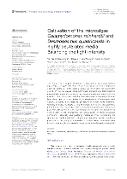Cultivation of the microalgae Chlamydomonas reinhardtii and Desmodesmus quadricauda in highly deuterated media: Balancing the light intensity

Autor
Kselíková, Veronika
Husarčíková, Kamila
Zachleder, Vilém
Bišová, Kateřina
Datum vydání
2022Publikováno v
Frontiers in Bioengineering and BiotechnologyRočník / Číslo vydání
10 (5 September)ISBN / ISSN
ISSN: 2296-4185Metadata
Zobrazit celý záznamKolekce
Tato publikace má vydavatelskou verzi s DOI 10.3389/fbioe.2022.960862
Abstrakt
The production of organic deuterated compounds in microalgal systems represents a cheaper and more versatile alternative to more complicated chemical synthesis. In the present study, we investigate the autotrophic growth of two microalgae, Chlamydomonas reinhardtii and Desmodesmus quadricauda, in medium containing high doses of deuterated water, D(2)O. The growth of such cultures was evaluated in the context of the intensity of incident light, since light is a critical factor in the management of autotrophic algal cultures. Deuteration increases the light sensitivity of both model organisms, resulting in increased levels of singlet oxygen and poorer photosynthetic performance. Our results also show a slowdown in growth and cell division processes with increasing D(2)O concentrations. At the same time, impaired cell division leads to cell enlargement and accumulation of highly deuterated compounds, especially energy-storing molecules. Thus, considering the specifics of highly deuterated cultures and using the growth conditions proposed in this study, it is possible to obtain highly deuterated algal biomass, which could be a valuable source of deuterated organic compounds.
Klíčová slova
microalgae, deuterium, light intensity, cell division, deuterated compounds, physicalstress
Trvalý odkaz
https://hdl.handle.net/20.500.14178/2857Licence
Licence pro užití plného textu výsledku: Creative Commons Uveďte původ 4.0 International







